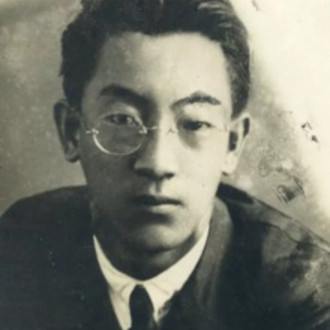Мы используем файлы куки, чтобы Bookmate и наши рекомендации работали лучше.
Подробнее на странице Политика Cookies
Подробнее на странице Политика Cookies
Принять все Cookies
Выбрать cookies

Kim Tongin was a Korean writer and a pioneer of modern realist and naturalist literature. Best known for his short story Sweet Potato (1925), his works vividly depict Korean life in the early 20th century during great social and political upheaval.
Kim Tongin was born on 2 October 1900 in Pyongyang, South Pyongan Province, into a wealthy landowning family. He studied at the Meiji Academy in Tokyo and briefly at the Kawabata School of Fine Arts before leaving to pursue writing.
In 1919, he co-founded the literary journal Creation (Changjo), which promoted "art for art's sake" instead of didactic literature advocated by figures such as Yi Kwang-su. Through Creation, Kim published his first story, The Sorrows of the Weak (1919).
Kim's most famous work, Sweet Potato (1925), marked a breakthrough in Korean realist fiction. The story depicts the decline of Boknyeo, a woman driven into prostitution by extreme poverty and her husband's greed. Its naturalistic perspective and raw depiction of social hardship challenged traditional Korean morality and opposed the ideological approach to literature prevalent at the time. Boknyeo's descent into despair symbolised the struggles of Koreans under Japanese colonial rule.
Throughout the 1920s and 1930s, Kim produced other acclaimed stories, including Hwang the Rustic (1925) and Sonata Appassionato (1930). The latter reflects his focus on aestheticism, telling the story of an artist consumed by the pursuit of perfection.
Despite his artistic successes, Kim's personal life was marked by financial difficulties and a lavish lifestyle financed by his inheritance. These difficulties led to periods of depression and drug abuse and drove him to write serialised popular fiction and historical novels.
Kim's later years were controversial. In 1939, he travelled to Manchuria under the auspices of the North Chinese Imperial Army, an act of collaboration that was viewed critically in Korea. In 1942, however, he was imprisoned for rebellion against the Japanese emperor.
After Korea's liberation in 1945, Kim joined the effort to rebuild Korean literature, co-founding the Pan-Korea Writers Association. He continued to write stories such as The Traitor (1946) and Man Without a Nation (1947), which criticised writers collaborating with Japan.
Kim Tongin died on January 5, 1951, in Seoul. In 1955, the Dong-in Literary Award was established to honour his contribution to Korean literature. In 2017, a collection of his short stories, which were previously untranslated, became available to English readers.
Kim Tongin was born on 2 October 1900 in Pyongyang, South Pyongan Province, into a wealthy landowning family. He studied at the Meiji Academy in Tokyo and briefly at the Kawabata School of Fine Arts before leaving to pursue writing.
In 1919, he co-founded the literary journal Creation (Changjo), which promoted "art for art's sake" instead of didactic literature advocated by figures such as Yi Kwang-su. Through Creation, Kim published his first story, The Sorrows of the Weak (1919).
Kim's most famous work, Sweet Potato (1925), marked a breakthrough in Korean realist fiction. The story depicts the decline of Boknyeo, a woman driven into prostitution by extreme poverty and her husband's greed. Its naturalistic perspective and raw depiction of social hardship challenged traditional Korean morality and opposed the ideological approach to literature prevalent at the time. Boknyeo's descent into despair symbolised the struggles of Koreans under Japanese colonial rule.
Throughout the 1920s and 1930s, Kim produced other acclaimed stories, including Hwang the Rustic (1925) and Sonata Appassionato (1930). The latter reflects his focus on aestheticism, telling the story of an artist consumed by the pursuit of perfection.
Despite his artistic successes, Kim's personal life was marked by financial difficulties and a lavish lifestyle financed by his inheritance. These difficulties led to periods of depression and drug abuse and drove him to write serialised popular fiction and historical novels.
Kim's later years were controversial. In 1939, he travelled to Manchuria under the auspices of the North Chinese Imperial Army, an act of collaboration that was viewed critically in Korea. In 1942, however, he was imprisoned for rebellion against the Japanese emperor.
After Korea's liberation in 1945, Kim joined the effort to rebuild Korean literature, co-founding the Pan-Korea Writers Association. He continued to write stories such as The Traitor (1946) and Man Without a Nation (1947), which criticised writers collaborating with Japan.
Kim Tongin died on January 5, 1951, in Seoul. In 1955, the Dong-in Literary Award was established to honour his contribution to Korean literature. In 2017, a collection of his short stories, which were previously untranslated, became available to English readers.
больше
годы жизни: 2 октября 1900 – 5 января 1951
Книги
- недоступно
Впечатления
💡Learnt A Lot
🎯Worthwhile
💞Loved Up
🌴Beach Bag Book
😄LOLZ
👍Worth reading
Very good I was very interested
- Нравится
- Комментировать
- ПоделитьсяFacebookTwitterСкопировать ссылку
- Пожаловаться
fb2epub
Перетащите файлы сюда,
не более 5 за один раз
